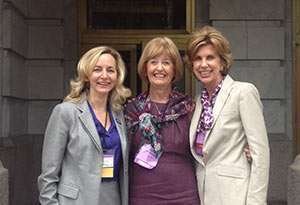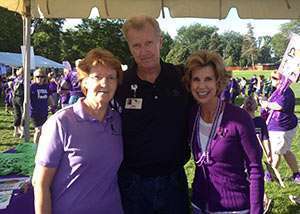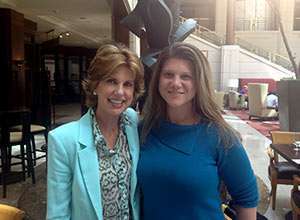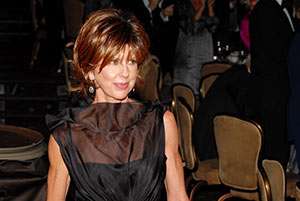 Julie Fleshman, President and CEO, Pancreatic Cancer Action Network; Diane Borrison, 7-year survivor; and Laurie MacCaskill, 7-year survivor, at Advocacy Day, Washington, DC, June 2013 |
My story begins like so many others. Seven years ago, I suddenly experienced a very sharp, intense lightening bolt of pain throughout my entire body – almost as if a sword was being driven through me. The pain lasted only about 5 seconds except for a small, lingering pain in the lower right side of my back about the size of a tennis ball, so I dismissed it. The next day, race-walking six miles with friends, I commented that I could not go very fast because of this nagging pain in my back.
When I returned home five days later, I immediately went to see a doctor. X-rays led to a diagnosis of “gas,” and I was told to take an enema. It didn’t feel like gas, but I did as instructed. A few days later I went to my internist, and after more x-rays, he told me that I’d pulled a muscle exercising. I know what it feels like to pull a muscle and again I did not believe this to be the case, but I stopped all exercise except for walking. The pain was constant, more intense at times, but I still maintained an active schedule. I had a healthy appetite, but was losing weight. I did not have a problem with THAT! I returned for more x-rays and blood tests when the pain did not cease. What could it be? I kept hearing, “It’s nothing,” until a week later I received a phone call from the doctor saying I needed to come in immediately; my blood count was so low I needed a blood transfusion.
I learned that I had a bleeding ulcer, which was so surprising as I never saw a speck of blood, never had a stomach pain or cramp, had a healthy appetite, felt great hiking 8-12 miles a day and had abundant energy. After one month of antibiotics, the back pain was still there. I begged my internist for more tests, not even sure what they should be. Perhaps a CT scan? After an advanced endoscopy and a colonoscopy, my doctor pronounced these dreadful words: “Laurie, you have pancreatic cancer.”
I barely knew what a pancreas did and certainly did not know about the duodenum where the cancer had spread in addition to some lymph nodes.
I was 55 years old, in terrific physical shape. Exercise was an integral part of my daily routine, as was being religious about my diet and medical check-ups. As avid outdoors enthusiasts, my husband and I would ride 100-mile bike races, ski all winter long, enjoy high-altitude hiking and more. Shocked at my diagnosis, I asked my doctor what I could have done differently. His response was ”Nothing.”
 Cancer Treatment Centers of America Ambassadors Hugh King (cancer survivor) and his wife, Carol, and Laurie MacCaskill |
I started on chemotherapy which was thwarted because of a biliary obstruction. The pain was unbearable and I became jaundiced. I had two back-to-back operations in a matter of hours to remove the obstruction, the first being unsuccessful. During the second I woke up – freezing cold and feeling immense pain – and asked the doctor what was happening. She replied, “I am pulling a needle in a tube through your liver and I can’t give you any more anesthesia.” Now, that was more information than I needed!
My surgeon came into my room and said, “If you were my wife, daughter or sister, I would insist that you have the Whipple surgery…NOW.” That was a Tuesday evening and I had the Whipple on Friday morning. I was extremely lucky that I qualified for surgery.
Seven and a half weeks later I started an aggressive chemotherapy treatment, which I remained on for three years. Doctors have commented that they don’t know how I have tolerated it. I always had a workload to occupy the hours and distraction while I was in treatment. I really look at this as just another thing on my calendar, and have been fortunate to complete a full day of meetings, run errands or go directly to the airport for a flight after treatment. That’s not to say I have not had the down days, leaving weak, exhausted and nauseous from treatment, and once my heart stopped five times, which took me into the ER – I have never known such pain and discomfort.
Naps were my new best friend and I have learned how to say “no” when I didn’t feel well enough to do something – well sort of! I lost my eyebrows, eyelashes and hair – twice. I have had eight toe and foot infections, constant pain in my feet and hands, eye infections, skin rashes, the inside of my mouth sometimes feels like someone took a blow torch to it, and the skin on my lips has burned so much that washing my face was a painful experience. Stomach pains lead me to taking pain pills, my scalp hurt as if I had a tight tourniquet around it and every joint hurt so much that any movement was a monumental effort. Something we take for granted — breathing — was a painful effort due to a lung infection. I would wake up in the middle of the night crying out in pain with my husband cradling me in his arms….the nightmares were so intense and unbearable because of the medications. I would wake up in a pool of water, shaking uncontrollably, crying hysterically, and even the loving embraces from my husband couldn’t ease the discomfort.
This was my new life – a new normal. But despite all this, I didn’t think about being sick as I intended to defy the odds. I had to remain positive no matter what.
 Laurie MacCaskill and 2007 Career Development Grantee recipient, Dr. Kimberly Kelly, University of Virginia, who was funded by a grant from Laurie and her husband, Paul MacCaskill |
Three and a half years ago I was told that chemo was no longer effective — that I was terminal and had four to six months to live. I could not accept this. I would seek other opportunities and fight this…and turn up my fun dial!! I had 12 liver biopsies and learned I had a serious liver infection; it was a gamble whether it could be cured.
For this, I was on an IV twice a day, one and a half hours each for a month. They wanted to administer this in a hospital twice a day and when I asked for another option since I would be traveling, they suggested a nurse could come to me twice a day. This also did not permit me to leave town, so I asked the doctor if I could administer the medication myself. He said no one had ever asked him this. I learned, and proceeded with my trips. One glorious morning in Colorado, I wanted to go on an early bike ride but my IV was still going. I simply packed everything up and put it in my fanny pack while my husband and I rode up a canyon. When the IV stopped, I found two bear proof containers on the side of the road, pulled out my small towel, syringes, alcohol swabs, etc., disconnected the tubes, flushed with the appropriate drugs and off we went. I felt I was responsible, careful and most importantly, LIIVING MY LIFE!!
Attitude – it has an incredible impact on our lives. The remarkable thing is we have a choice every day regarding the attitude we will embrace that day. I am convinced that life is 10% of what happens to me and 90% how I react to it.
Through my “survivorship” I have learned that contentment is not the fulfillment of what you want but the realization of what you already have. I am very lucky and have an incredible quality of life. Does that mean I didn’t have harsh and debilitating side effects and experience extreme pain? Absolutely not. I had it all. But thankfully I had a wonderful caregiver, my husband, Paul. I could not have made it past the pain and terrible side effects without Paul, our loyal friends and my extended family that is the Pancreatic Cancer Action Network.
As a seven-year pancreatic cancer survivor, I know all too well how incredibly lucky I am to be alive. I also know that I would not have been able to keep a hopeful and courageous spirit without the help of this remarkable organization. Over the years, I have become very involved with the Pancreatic Cancer Action Network. I have served on its board for the past three years and now I am so honored to have been elected board chair. I also understand the significance of being a survivor and serving in this important role.
 Laurie MacCaskill, Spirit of Hope honoree at An Evening with the Stars, 2007 |
A big part of my life the past seven years has been supporting the pancreatic cancer community. I have done this by attending Advocacy Day each year and speaking to our elected officials about the urgency to make pancreatic cancer research a national priority. I have attended inspirational PurpleStride events all over the country. And I am lucky that my husband and I had the opportunity to fund two research grants through the Pancreatic Cancer Action Network. These researchers are making a real difference in the lives of pancreatic cancer patients and their families and those yet to be diagnosed.
Pancreatic cancer gave me a new title, “Survivor.” But I don’t plan to just survive. I am thriving and passionate about the future, and very hopeful about the progress being made in Washington, DC, as a result of the passing of the Recalcitrant Cancer Research Act (formerly the Pancreatic Cancer Research & Education Act) and the progress being made in research labs across the country with a growing scientific community dedicated to pancreatic cancer. I am also grateful for the “never give up” attitude of the Pancreatic Cancer Action Network. We are all making a profound difference.
We can look at life and think difficult and bad things will happen. But when they do, we get to decide what that means and how we want to live our life.
I used to think my story was insignificant and boring; that I should be providing only factual information, statistics and such. But the feedback I constantly receive is that my positive attitude has provided inspiration, hope and guidance, and encouraged many to better understand that they are not alone and that there is hope. Dreams don’t happen because we dream them…they happen because we do something about them. I look forward to serving as board chair and representing survivors and the entire pancreatic cancer community in our journey to change the course of history for this disease!





